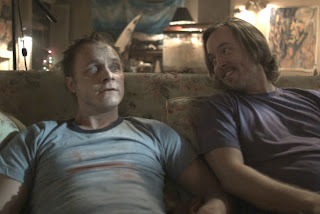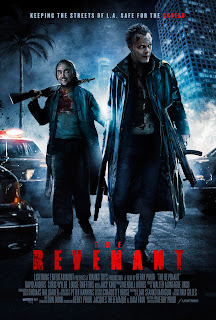I don't think I've ever waited as long for a movie to come out – from first announcement to final release – as I have for Kerry Prior's The Revenant. The film, first announced back in the netherworld of 2008, has always hovered in the recesses of my mind as I waited for a release, and as 2008 became 2009, and then 2010 and so forth, from time to time that gentle, nagging question would pop into my head: hey, where the fuck's The Revenant?
Four long years it has taken for it to finally mingle with the masses. Forget all the film festival stuff and those lucky websites out there with the mojo and name recognition to obtain an early view. This shit's finally on video.
So was it worth it? Four years of waiting, perusing the usual websites for news, and even checking in with Prior himself? Could it really have been worth all of that time?
You bet your ass it was.
Back in 2008 when news first hit, The Revenant was nothing more than a zombie movie. It was hard to track down specific plot details, and beyond the movie obviously falling within the confines of horror, there was no indication of what direction the film would take. But based on what the movie seemed to be about, and more so based on who was involved (Kerry Prior – more on him in a second), I became instantly intrigued.
So, is The Revenant a zombie movie? Perhaps a vampire movie, as other reviewers have labeled it? Nah – it's neither. Obviously, it's about a revenant – a spirit that returns from the dead in corporeal form.
Barthenoy Gregory (Bart for short, played by David Anders) is a lieutenant in the US Army. While tearing ass across the desert in a Humvee smack-dab in the middle of Baghdad, he is shot down by a band of machine-gun-toting Iraqis. He receives a hero's burial, and his girlfriend, Janet (Louise Griffiths), is a mess. Bart's best friend, Joey (Chris Wylde, a seeming amalgamation of Nic Cage, Paul Giamatti, and Aaron Paul), does his best to comfort her. Then they kinda-sorta have sex.
Bart, for reasons unknown, returns from the dead and to his best friend's door. Joey is simultaneously horrified, disgusted, and overjoyed to see that his best friend has returned. Despite his horrid appearance, they act like everything is normal (though admittedly weird). But it seems Bart can't hold down normal food without spewing torrential black blood, and after a discussion of just what Bart is – zombie? vampire? ah, a revenant – it's determined he needs fresh blood to keep himself from decomposing. So off to the hospital they go, which is just the first of their many misadventures.

For the first three years or so of The Revenant's struggle for tangibility, I had no idea that it was meant to be a comedy. And three years ago, the idea of making a low budget zombie movie hadn't yet become as saturated as it is today. But in the past year, once things began heating up for Prior et al., I was surprised, and admittedly disappointed at first, to learn The Revenant was a horror/comedy hybrid. In my experience, many filmmakers try to combine the two, and for the most part, fail. Edgar Wright's Shaun of the Dead is an ingeniously screaming example of when it works. And I suppose that's the best measuring stick to use for The Revenant. It is, after all, about two slacker-like fellows (despite the one's presence in the military) trying to live life as they normally did, even though one of them is dead. Humor derives from this conflict almost effortlessly, as well as from the rapid-fire dialogue, peppered with the kind of sarcasm of which Kevin Smith was capable during his very short peak. And the humor works, every single time. Not one single joke or gag goes by that will not elicit at least a smile. For instance, after Joey takes Bart to the hospital following his recent resurrection – and after it's been well established that Bart spews blood like a geyser, had to snip off the mortician's thread keeping his lips closed, and is also most definitely dead – he writes "general malaise" for his purpose of visit on his emergency room form. And there's no way you're not laughing at that.
Prior, serving double-duty as writer and director, has absolute confidence in the story he is telling. For what was most assuredly a low budget, Prior stretches every dollar – every cent – to masterful effect. The Revenant looks like a multi-million dollar movie, including sweeping helicopter shorts, on-location shooting in both Los Angeles and Iran, and some of the best special effects I've ever seen for such a low budget. That last bit shouldn't be all that surprising, as Prior made quite a career having done special effects for such films as Phantasm II, The Abyss, and Air Force One. (It was his affiliation with the Phantasm series that had instantly piqued my interest in The Revenant's announcement way back when.) Because the bulk of the action takes place on L.A. streets, the city itself becomes a character, and Prior aids that transition with his completely fair and objective take on the City of Angels. Much like any other major city in the world, there are areas that are beautiful and completely iconic, and there are other areas that belong to the unscrupulous, the deviant, and the dangerous. Joey and Bart find themselves mingling in both worlds, but it's in that second world where they are reborn as the media-dubbed "Vigilante Gunmen," who dispatch the criminals that have it coming so Bart can have a go at "sucking them off."
All of that "big" stuff aside, what most impressed me about the film were the small details – stuff normally included in more standard movies so it can serve a purpose later. For example, for several scenes that take place in Joey's apartment, you can hear through the wall the reoccurring and shaky practicing of scales on a piano. The person playing the piano never becomes a character, is never referred to, and is never even shown. There is no reaction shot of them included to induce a cheap moment of comedy. It's just a small, perhaps unnoticed, but very appreciated detail. Because it's the soft, unsteady piano playing you hear through the wall that makes life what it is. It's the boring stuff, the mundane. We don't all live grand lives. Not all of us will one day do great things. We'll go to work, come home, make a half-hearted dinner, and hear what our neighbors are doing through the walls.
And at its root, that's what The Revenant is about. In the film's third act, Joey relents the lack of life he and Bart have lived. He talks of all the big important things they had always talked about doing, but never managed to do. And, in the middle of this very foul-mouthed, morbid buddy comedy, that's very saddening.
For most of its running time, The Revenant wants to make you laugh, and in that regard the film is a complete success. But there are also times where Prior wants us all to step back and realize that the events that have befallen our characters are actually quite tragic, and so for brief stretches there is no humor, and what we see is to be taken quite seriously. But it never interrupts the flow of what is by and large a comedy.
The Revenant ends in a surprisingly bleak and cynical fashion, which reinforces this idea of life over which Joey and Bart mourned earlier in the film. Each major character suffers an ending that, in a more typical genre movie, would be either gloriously dramatic or cheaply amusing, depending on the intended reaction. But here, in The Revenant, our characters' arcs end in very anti-climactic ways. This is not a weakness in Prior's script or intent, but once again is another confirmation that that's just life. We don't end big and bad. We don't go out in a blaze of glory. We die in the kitchen, or under a bridge. We die without last words and without having accomplished our goals, meager as they may have been.
Prior has a lot to say, and he uses The Revenant to say it. Setting the film in Los Angeles allows him to fill his script with references to different ethnicities and the difficulties that come from their co-habitation. He has a lot to say about war and our completely unsympathetic government. He has a lot to say about the human spirit and how it can become easily corrupted once someone hits what Chuck Palahniuk has dubbed "rock bottom." But he also has a lot to say about the bonds of friendship and how literally death cannot kill the love that Joey and Bart share "in a completely non-gay way."(And if there is any movie on the planet that perfectly encapsulates the mantra "bro's before hoes," it's definitely this one.)
I sincerely hope that The Revenant is just the first of many genre offerings that Prior will be gifting to us in a hopefully long career. I hope the long road to getting his directorial debut out in the world hasn't exhausted him in such a way that he's wary about working on his next project. As far as first films go, The Revenant is a remarkable achievement. It is hilarious, sarcastic, touching, sad, and angering. It takes a well-worn concept and infuses it with a tremendous amount of contagious energy.
Four years later, I have a gigantic smile on my face.
Special Features
As far as features go, the DVD includes a brief behind-the-scenes look at the making of the movie. There are no sit-down interviews here, but a more fly-on-the-wall approach that mostly captures the mugging going on behind the scenes involving the two leads and the producer kind of making an ass out of himself in more than one situation. The approach to this mini making-of as well as the action captured shows that, regardless of the long battle Prior may have fought in getting the film completed, it looked like a hell of a lot of fun.
Two feature commentaries – the first with Prior and the second with the cast – as well as the trailer for this film and other Lionsgate offerings are also included.
Speaking of, I'd like to very quickly thank Lionsgate for having faith in Kerry Prior and picking this film up for release. They're a studio that gets a lot of shit for their complete whoring of the Saw series, as well as their hundreds of completely inexorable direct-to-video travesties they unleash on us year after year, but after their salvation of both this and the recent Cabin in the Woods, I have to give credit where credit is due. There is no other studio out there taking the kinds of chances that Lionsgate is taking, and so for that, they have my gratitude.





























